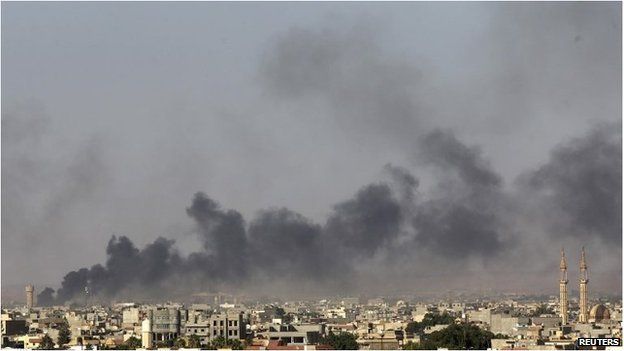Libya clashes kill 38 in Benghazi
- Published

At least 38 people have been killed in clashes between troops loyal to the Libyan government and Islamist fighters in the city of Benghazi, officials say.
The militants attacked troops in the centre of the city, in eastern Libya.
A week of fighting in the capital Tripoli, near the airport, has left 97 people dead and 404 injured.
Later it was reported that a fuel storage site in the area had been hit by a rocket and fires there could cause a disaster if not kept under control.
Officials say the site, which is the city's largest storage facility and a major hub for distribution of petrol, contains some 6.6 million litres of fuel
A statement by the prime minister's office said the government was asking for international assistance in putting out the flames.
Officials said an area within a radius of 3-5km, containing many residential homes, could be affected.
'Real risk'
Militias controlling large parts of the country are behind Libya's worst violence since the 2011 uprising that toppled Col Muammar Gaddafi.
On Saturday, the US evacuated its embassy in Tripoli, citing a "real risk" because of the fighting.
Secretary of State John Kerry says violence in Libya presents a "very real risk" to US embassy staff
Turkey has also withdrawn some 700 members of staff from Libya.
Earlier this week, the UN also announced it was withdrawing all its staff from Libya.
Analysis: Rana Jawad, BBC News, Tripoli
The distribution of armed groups across the country means the weapons are evenly spread out - and most battles achieve little beyond a trail of destruction.
It is tricky territory for Western players, and recent efforts by the UN mission in Libya to bring political and militarised sides to a negotiating table failed.
It is common for rival groups to accuse each other of being tied to Col Gaddafi's regime.
Stark warning
In the past two weeks, fighting in Libya's two largest cities Tripoli and Benghazi has been intense, deadly and show few signs of abating, says the BBC's Rana Jawad in Tripoli.
Libyan government officials warned of the possibility of a break-up of the country if clashes over Tripoli airport continue.
Rival Libyan militias have been locked in battle at Libya's main airport in the south of Tripoli since last week, forcing the airport to shut.
Members of the Islamist Libya Revolutionaries Operations Room (LROR) are trying to seize control of the airport, which has been in the hands of the Zintan militia since the overthrow of Col Gaddafi.
Egyptian news agency Mena said 23 Egyptian workers were killed Saturday when a rocket hit their residence in Tripoli.
Our correspondent in the capital says both militia groups are believed to be on the official payroll.
The government has been unable to disarm the numerous armed groups that took part in the 2011 uprising and which have divided the country.
In Benghazi, a coalition of forces including the army have been led by a rogue former general Khalifa Haftar for months.
They say they aim to dislodge Islamist militants from the city.
Residents in Benghazi have told the BBC these are the fiercest clashes they have seen since the launch of this operation.
US ambassador Christopher Stevens and three other Americans were killed in an attack on the US consulate in Benghazi in September 2012.